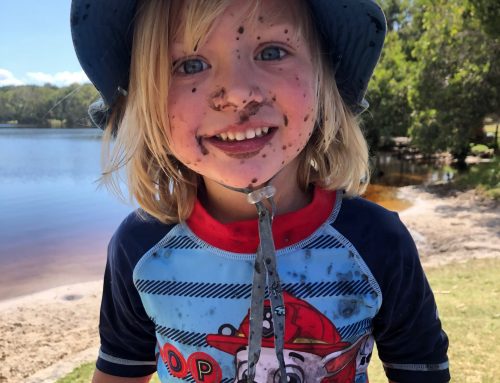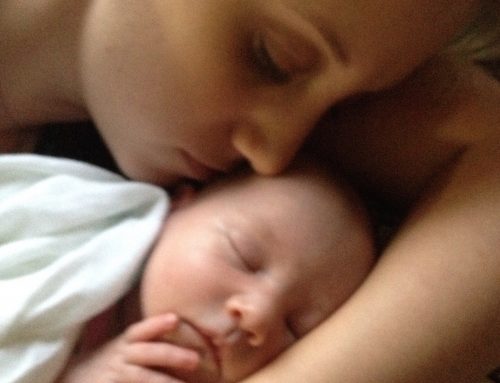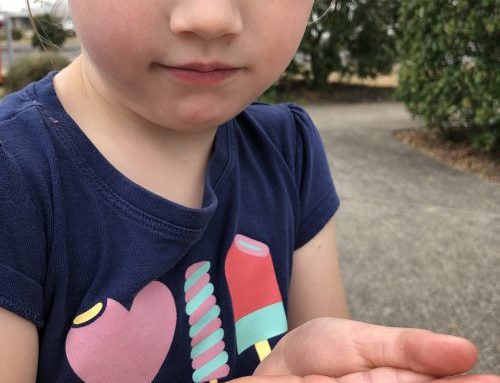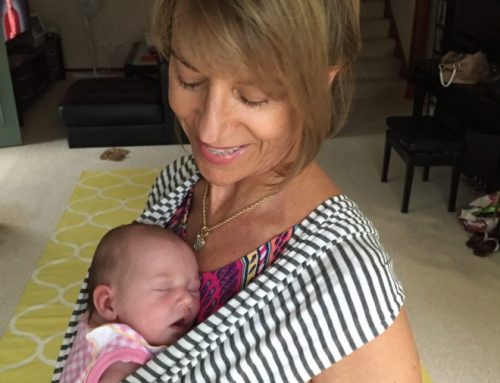- I don’t care what anyone says, even with a good latch, you can still get sore nipples and may even get nipple damage. Take my situation, I’m a midwife, I had help from a great lactation consultant and midwife, a sympathetic and helpful mother, even my dad is breastfeeding savvy and with all that, I wasn’t pain-free until five weeks in.
Unless you’re born with tough, long nipples then you can bet there is going to be some degree of discomfort in the early days of breastfeeding. No matter what. I mean, think about it. Most people haven’t had a hoover-type device attached to their breasts prior to breastfeeding. And that’s exactly how I would describe your sweet newborn.
Unfortunately for me, I was blessed with flattish, delicate nipples and within a week they were horribly mangled. I’m not exaggerating. We’re talking splits, cracks and even pus… Every time she latched, the first 30 seconds of the feed felt like 1000 hot needles were piercing through me as she dragged my sore, flat nipple along her hard palate to her soft palate at the back. It was agonising. Excruciating. I tried to make her latch deeper, for her to get more breast tissue in her mouth, but there’s really only so much you can do with flat nipples. By the time she was 15 days old I couldn’t bear it any longer, they just weren’t healing due to her frequent feeds. So I needed to rest them and express for 48 hours and feed Lara my milk out of a bottle. After that they were healed enough so I could feed her comfortably with nipple shields. Then, out of fear of damaging them again I continued to use the shields for another 3 weeks until I gained the confidence to feed again without them. By this time, they had healed completely and amazingly, the splits healed like a pulled-out telescope to make my nipples longer and tougher. I now joke that Lara decided that my flat nipples weren’t going to suit her, so she gave me a handy nipple reconstruction.
So here I am, proof that even if you baby annihilates your nipples in the early days, they will heal and they will heal quickly, I promise. Bottom line: if you think you need a break from putting baby to the breast to aid the healing process, then I would do so with the help and guidance of a skilled lactation consultant.
- Here’s one of my favourite pieces of advice: “if you need a break, why don’t you just pump and get your husband to give her a bottle?” Really? Do you know how much extra work that entails? Pumping is a pain in the arse. I also could never figure out the right time to pump. Finally I did work out that it was first thing in the morning, then discovered that it’s near impossible to entertain a small child AND pump at the same time. A month or so ago, in preparation for going to support a friend during her labour and birth I managed to find the time to pump and store around 800mL over the course of 2 weeks. Then the night she went into labour I was gone for 5 hours overnight. How good it was that I had left all that milk for my 2 hourly overnight feeding baby! When I got home, do you know how much of that 800mL hubby had needed to feed her? None. She had slept the whole time. Well played Lara, well played.
So if your mother-in-law starts bugging you to pump so she can “help out” by giving the baby a bottle, you have my permission to glare at her and suggest she cook you dinner instead.
- Breastfeeding is messy! The first time Lara pulled off in the middle of a feed and my milk sprayed her in the face, I think I was more shocked than she was. I actually had no idea that it can be like a water pistol. Now Lara is older and more curious it happens all the time. When we’re out in public and she pulls off to see what’s going on behind her or look up and smile at the waiter taking our food order. That’s always fun. She’s grinning away and my boob is soaking my top and I’m trying to act cool and nonchalant in front of the surprised, but always polite waiter (even in these situations I have never had any negativity directed towards me for openly breastfeeding in public. For any mothers who are anxious about feeding out and about, I say just do it. You will be pleasantly surprised by how many people will offer you encouraging smiles, and the rest won’t even notice or care).
Then apart from the milk all over her face when she’s finished there’s the occasional vomit when she has decided that, whoops, I didn’t actually need that feed mum! You can have it back… on your clean shirt.
- Then just when you think it’s all easy-peasy, teeth happen. The same week Lara got her two bottom teeth, she bit me, several times, all accidental of course. And yes, I swore, very loudly. Sorry, Lara. It seems that just as she’s drifting off to sleep, her jaw clenches and chomp! After my early days of nipple damage, I honestly thought my nipples could handle anything, but suddenly every latch was agony again as her little teeth had caused pretty nasty splits under each nipple. Mum suggested I try the shields again but Lara was not amused and just pulled them off. I asked dad what he thought I should do. He suggested I take her off just as she is falling asleep and pop in her dummy instead. This was sad as I loved letting her fall into a deep sleep while sucking away, but I just couldn’t bear another nip so I took his suggestion. Once again my nipples have proven how quickly they can heal. Just in time for four shiny new top teeth that have just come through this week. Uh oh…
- Finally, the most important thing I learnt on my breastfeeding journey is that SUPPORT IS EVERYTHING. I couldn’t have been more lucky. I gave birth to her in a “Baby Friendly” accredited hospital, which meant I was fully supported with early contact and giving her only breastmilk from birth. When I went home I had my private midwife Sheryl for support, as well as my husband and parents. I also had midwife-friends and some very experienced colleagues who gave me invaluable assistance. And as valuable as community and hospital support is, I truly believe that the most important support comes from within the home – husbands/partners, parents, in-laws… In those early weeks after giving birth, these people need to be the new mother’s cheer-squad. They need to encourage and reassure her, especially when crazy hormones, lack of sleep and just that general post-natal haziness amplify the routine breastfeeding difficulties. My husband especially was such a wonderful help, and continues to support me 100% in continuing to breastfeed our daughter for as long as possible.
I asked him as I was writing this blog why he thought it was so important for husbands and partners to support new mothers who wish to breastfeed their babies. Ever the comedian, his response was: “because it will mean the men get more sleep… they won’t need to get up at night to feed the baby!”
So there you have it guys. If that isn’t incentive enough to support your partners, I don’t know what is.










Thank you for sharing your honest and funny insights Georgy! Love this latest instalment, please keep them coming! Curious mum question: when you expressed first thing in the morning, was it before or after feeding Lara? And if it was before, was she satisfied with the feed that followed? Thanks!
Hi Trish! Thank you, I’m glad you enjoyed reading my blog. I just pump from the opposite side to that which Lara takes first thing in the morning, as she usually only has 1 side per feed. If your baby has taken both sides, I would recommend you feed her first then wait 30 mins-1 hour and then pump. Your breasts will usually refill in about 30 minutes. Good luck! 🙂
As a committed breastfeeding mom who suffers from EXTREME, cracked, bleeding, “Are you freaking kidding me!” pain for the first 6 weeks as well, I just wanted to share a bit of advice here. Around the third day, I start using a pump for all feeds for 24 hours. (There are various ways to feed baby like using a syringe, so there isn’t nipple confusion, or of course a bottle). But giving my breasts that 24 hour break, while allowing the breast milk to heal them during each pump, makes a HUGE difference. I completely agree how pumping does NOT make life easier. It’s like doing feeds twice instead of once. But the level of pain is so severe it is worth it. I continue using the pump for half the feedings the next day and then for the occasional feed the next, and so on until the breasts are a manageable pain. Getting past those first 6 weeks is key! My second child turned 2 in July, and we are still breastfeeding twice a day. Love it!
Hi Georgy – really enjoying your blog. I have a seven month old boy who has always been a good feeder but hates going to sleep and the fight to get him to sleep has become so stressful for us both. Lately I’ve decided to feed him to sleep as we are both more relaxed and it makes a huge difference to our days. But the big question is – what happens come 7pm when it’s his bed time but I want to stay up later to eat dinner and unwind etc. he tends to wake up when I leave his side… Just wondered what you do in the evenings. Thanks, Amy
Hi Amy, sorry for the late reply, I hope you see this! That’s a tricky one. I tend to lie with Lara until she falls asleep and then lie there playing with my phone in the dark for another half an hour or so until I’m sure she’s deeply asleep. Then I can slip away and enjoy the rest of my evening (until she stirs for her first feed, usually 3 hours later.) We then keep an eye on her using a baby monitor that I set up on our bed.
Keep trying, but make sure he is in a deep sleep before you leave (soft breathing, heavy limbs, very little movement – how long it takes him to get into this deep sleep will depend) and keep an eye on him and go back in as soon as he stirs so that he learns that even if you’re not there when he wakes, you’re not far away. Also, remember that babies change so quickly. It seems like only yesterday I had to rock Lara to sleep for about 45 minutes, and now we just lie down together and she falls asleep. Hang in there!
Hi Georgy, thanks so much for writing this post. Breastfeeding has been a real journey for me too. I just have a quick question re: feeding to sleep. I love to do it as well, esp at night. Just wondering if you feed to sleep for daytime naps as well? Thanks again!
Hi Jean, sorry for the late reply and I’m glad you liked the blog. I *try* to feed to sleep for daytime naps too, but she doesn’t fall asleep. So, I feed her, then hand her the dummy which she pops in herself (so cute!) and then cuddle her until she drifts off (or until she rolls away from me, starts playing with the blinds and trying to crawl off the bed… Then I have to grab her and start all over again until she gives in to sleep 😀 Haha.) But if she did fall asleep at the breast for day time naps I would love it, it would be so much easier! I say if your baby does, then enjoy it while it lasts!! 🙂